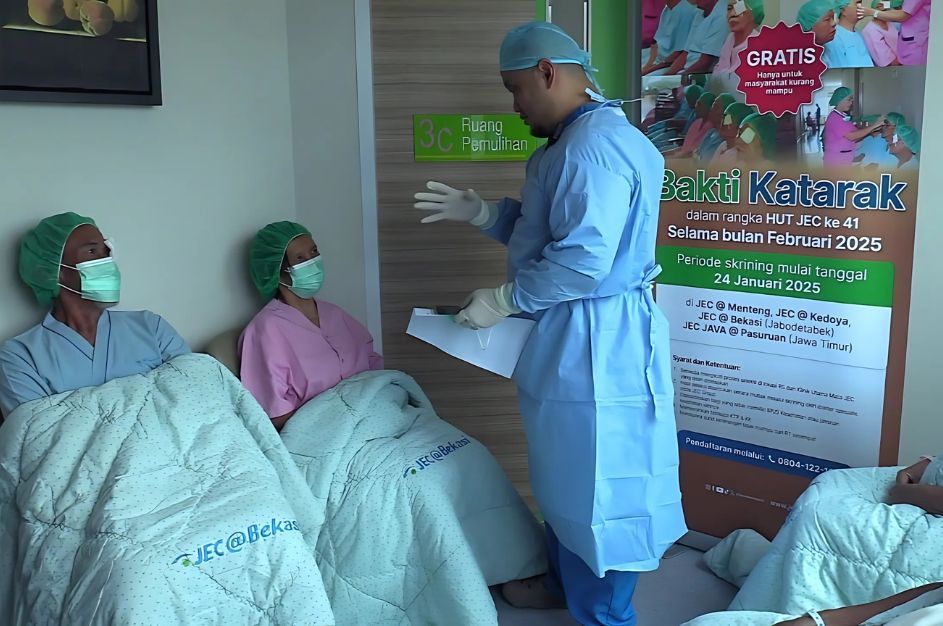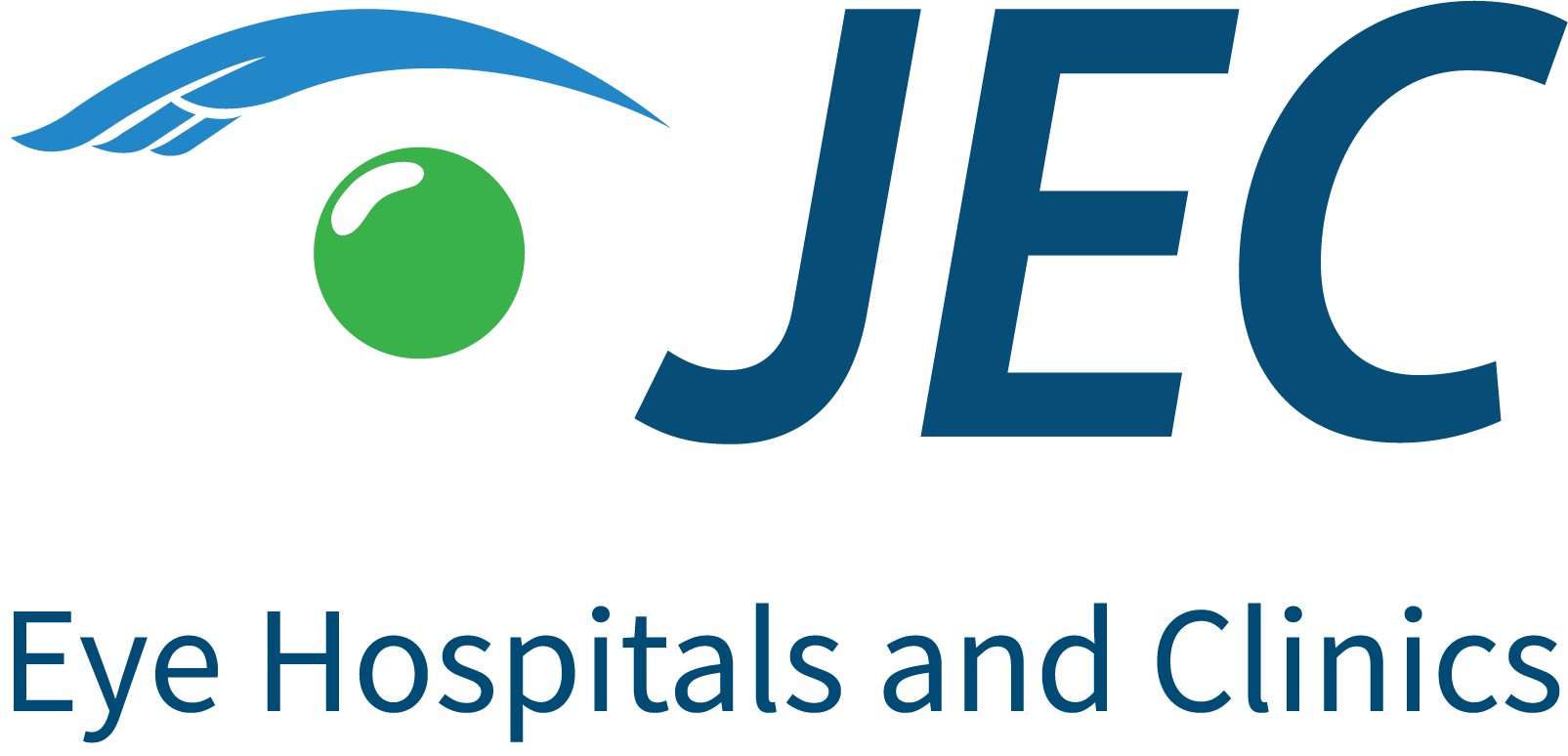
- 100 million people: The global number of cataract patients
- More than 250,000 new cataract cases emerge each year, while the number of cataract surgeries performed only reaches 180,000 annually
- Investing in cataract treatment can generate an economic return of up to 20 times
- JEC Eye Clinic @ Bekasi is part of JEC Eye Hospitals and Clinics
Jakarta, February 15, 2025 – The Cataract Epidemic in Indonesia Remains Alarming!
An estimated over 250,000 new cataract cases emerge each year in Indonesia. However, the number of cataract surgeries remains far below the demand, reaching only 180,000 procedures annually. Public education must be intensified, and cataract surgery efforts must be consistently carried out!
As a proactive effort to provide concrete solutions, JEC Eye Hospitals and Clinics, Indonesia’s leader in eye care, is once again holding Bakti Katarak—a free cataract surgery initiative for those in need. This program also commemorates JEC’s 41st anniversary, benefiting a total of 150 cataract patients. The free cataract surgeries will be conducted simultaneously throughout February 2025 at five JEC branches: JEC Eye Hospital @ Menteng, JEC Eye Hospital @ Kedoya, JEC Orbita Eye Hospital @ Makassar, and JEC Eye Clinic @ Pasuruan, with today’s kick-off event at JEC Eye Clinic @ Bekasi.
“Optimizing vision and quality of life has been JEC’s mission since its establishment in 1984. We believe that eyesight is a vital human sense. Loss of vision due to cataracts leads to a decline, even the complete loss, of a person’s productivity, as they become dependent on others for daily activities. Yet, cataract-induced blindness is a rehabilitative condition. Many people lack access to proper treatment. Through the continued implementation of Bakti Katarak, JEC is committed to restoring their vision and enabling them to lead a productive life again,” said Dr. Johan Hutauruk, Sp.M(K), President Director of JEC Corporate.
Beyond Social Impact: The Economic Burden of Cataracts
In addition to its social impact, cataract-related blindness also carries a significant economic burden. On average, patients suffering from blindness in both eyes incur expenses of IDR 170–196 million, excluding indirect costs due to lost productivity. As part of its commitment, JEC is conducting Bakti Katarak to help address this issue. Cataract surgery has been proven to have a substantial economic impact, with every USD 1 invested in cataract treatment generating an economic return of up to USD 20.5.
Cataracts remain the leading cause of blindness worldwide. In 2020 alone, there were over 100 million cataract patients, with 17 million experiencing permanent blindness. In Indonesia, PERDAMI (Indonesian Ophthalmologists Association) reports that 8 million people suffer from vision impairment, including 1.6 million cases of blindness—81.2% (approximately 1.3 million people) of which are caused by cataracts.
41 Years of JEC: Love Your Work
“For our 41st-anniversary celebration, JEC has chosen the theme ‘Love Your Work’ to emphasize the importance of maintaining eye health as part of professional well-being. Loving your job is inseparable from having good vision. That’s why we are committed to providing compassionate eye care, ensuring that everyone has access to reliable and high-quality eye treatment. This commitment is reflected in the implementation of Bakti Katarak. With the dedication, expertise, and extensive experience of our medical team, we are determined to help cataract patients regain their sight, allowing them to return to work and lead productive lives—so they can truly love their work once again,” added Dr. Johan Hutauruk, Sp.M(K).
JEC has provided free cataract surgeries to nearly 4,000 underprivileged individuals over the past four decades. To expand its reach, this year’s Bakti Katarak program will be conducted simultaneously across five branches, spanning four cities in four provinces. The JEC Eye Clinic @ Bekasi has been chosen as the first location for this initiative.
JEC @ Bekasi: Supporting the Workforce with Better Vision
“As a supporting region of Jakarta, Bekasi is one of Indonesia’s key industrial centers. The eye health of Bekasi residents, especially workers, plays a vital role in sustaining industrial productivity. Therefore, we hope that by implementing Bakti Katarak at JEC @ Bekasi, we can effectively reach those in need—helping them regain their independence and productivity,” said Dr. Nashrul Ihsan, Sp.M(K), Head of JEC Eye Clinic @ Bekasi.
After surgery, beneficiaries will receive free follow-up care, including post-operative check-ups and necessary medications until full recovery.
Comprehensive Cataract Treatment at JEC
For cataract management, all JEC Eye Hospitals and Clinics, including JEC @ Bekasi, offer a comprehensive, integrated service: Cataract, Lens & Refractive Surgery Services, which has been available since JEC’s inception. This service provides advanced diagnostic technologies to detect cataracts and offers various surgical treatment options, including:
Phacoemulsification, and
Femtosecond Laser-Assisted Cataract Surgery (FLACS).
Over the past 41 years, JEC has successfully performed more than 200,000 cataract surgeries.
JEC’s Innovations and Future Plans for 2025
As part of “41 Years of JEC: Love Your Work”, JEC Eye Hospitals and Clinics have planned several groundbreaking initiatives for 2025, including:
The launch of the Dry Eye Spa at JEC @ Kedoya—a revolutionary eye care service that combines medical treatment with the comfort of a spa experience.
Expansion with a new branch, JEC @ Kediri, set to open mid-year.
The 5th JEC International Meeting (JECIM) in April 2025—bringing together ophthalmology experts from Indonesia and abroad for a global knowledge exchange.
Sumber Referensi:
[1] Ministry of Health of the Republic of Indonesia: "Cataracts Cause 50% of Blindness" (2016); https://sehatnegeriku.kemkes.go.id/baca/rilis-media/20160109/5713946/katarak-sebabkan-50-kebutaan/
[2] Ministry of Health (2019): "Cataracts: The Leading Cause of Blindness in Indonesia"; https://sehatnegeriku.kemkes.go.id/baca/umum/20191007/4131952/katarak-penyebab-tertinggi-kebutaan-indonesia/
[3] IAPB "Cataract or Uncorrected Refractive Errors Account for Most Vision Loss" (2020); https://www.iapb.org/learn/vision-atlas/causes-of-vision-loss/



 INA
INA